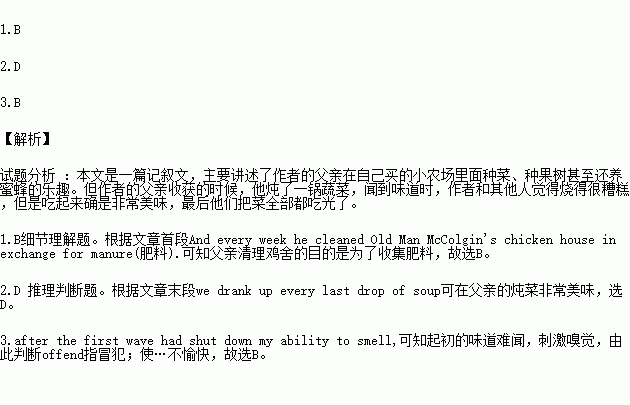题目内容
Nothing could stop Dad. After he was put on disability for a bad back, he bought a small farm in the country, just enough to grow food for the family. He planted vegetables, fruit trees and even kept bees for honey.
And every week he cleaned Old Man McColgin's chicken house in exchange for manure(肥料). The smell really burned the inside of your nose. When we complained about the terrible smell, Dad said the stronger the manure, the healthier the crops, and he was right. For example, just one of his cantaloupes(甜瓜) filled the entire house with its sweet smell, and the taste was even sweeter.
As the vegetables started coming in, Dad threw himself into cooking. One day, armed with a basket of vegetables, he announced he was going to make stew(炖菜).Dad pulled out a pressure cooker(高压锅)and filled it up with cabbages, eggplants, potatoes, corns, onions and carrots. For about half an hour, the pressure built and the vegetables cooked. Finally, Dad turned off the stove, the pot began to cool and the pressure relief valve sprayed out a cloud of steam. If we thought Dad's pile of chicken manure was bad, this was 10 times worse. When Dad took off the lid, the smell nearly knocked us out.
Dad carried the pot out and we opened doors and windows to air out the house. Just how bad was it? The neighbors came out of their houses to see if we had a gas leak!
Determined, Dad filled our plates with steaming stew and passed them around. It didn’t look that bad, and after the first wave had shut down my ability to smell, it didn’t offend the nose so much, edible, and we drank up every last drop of soup.
1.Why did Dad clean Old Man Mocolgin’s chicken house regularly?
A. To earn some money for the family.
B. To collect manure for his crops.
C. To get rid of the terrible smell.
D. To set a good example to us.
2. What can we infer about Dad’s stew?
A. It is popular among the neighbors.
B. It contains honey and vegetables.
C. It looks very wonderful.
D. It tastes quite delicious.
3.What does the underlined word “offend” in the last paragraph mean?
A. To attract B. To upset
C. To air D. To shut

